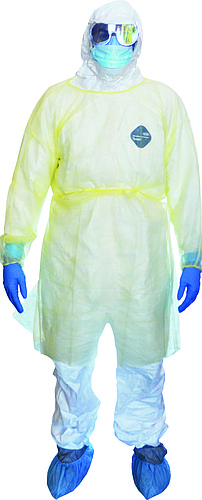- May 10, 2024
-
-
Loading

Loading

“Is the town prepared for Ebola?”
Longboat Key Fire Rescue Chief Paul Dezzi has gotten the question from concerned citizens in recent weeks. His answer:
“We’re as ready as we can be.”
Town Manager Dave Bullock announced at the end of the Longboat Key Town Commission’s Oct. 20 regular workshop that its police and firefighter/paramedics are fully integrated with the county health departments’ protocols for handling suspected Ebola patients.
Commissioner Lynn Larson asked Bullock if the town bought hazmat suits that cover the necks, referring to the protocol breach that allegedly occurred at Texas Presbyterian Hospital, where nurses treated an Ebola patient in protective clothing that left their necks exposed. (The answer: Yes.)
“It’s a low probability that we would be faced with it, but we have to prepare because we have so many international residents and people who travel,” Larson told the Longboat Observer.
According to Dezzi, each fire and emergency medical services department in Florida must implement an infection control protocol for dealing with a suspected Ebola case.
Because Longboat Key Fire Rescue handles both fire and EMS calls, it was required to develop its protocol with its medical director, Dr. Steven Newman.
The town has purchased 40 hazmat suits at a cost of $30 each and four respirators that hook into air masks at $900 apiece to use if firefighter/paramedics believe a patient may have the virus.
But the most important step in the protocol begins before firefighter/paramedics arrive at the scene.
“The dispatch center is the first line for us,” Dezzi said. “A lot of our patients have flu or cold symptoms, so if you call 911, there’s a CDC (Center for Disease Control) protocol in place where the dispatcher asks you if you have been traveling to a list of countries.”
If the patient has traveled to an affected country in West Africa, the dispatcher asks other questions, including whether the patient has a fever, and transmits that information to first responders.
Firefighter/paramedics would then use universal precautions, including wearing protective gear. They would also notify hospitals and local health agencies. The department would limit exposure, possibly sending just one or two firefighter/paramedics to treat the patient.
“It’s a common sense approach to this,” Dezzi said. “You’re not going to send everybody out to a fire,” he said.
The department would determine if it evacuates properties after an exposure on a case-by-case basis, according to Dezzi. Whether an entire condominium building would be evacuated might depend on whether it has interior or exterior hallways.
Dezzi said that departments develop similar protocols whenever a contagious disease surfaces.
Departments went through the same procedures with SARS and bird flu. Dezzi remembers the early days of the AIDS epidemic, when firefighters were trained to wear air tanks for protection when they treated a patient they knew or suspected had the virus.
As knowledge about any disease increases, first responders adjust their protocols accordingly.
“People are going to be concerned,” Dezzi said. “When someone sneezes, people are going to question it.”